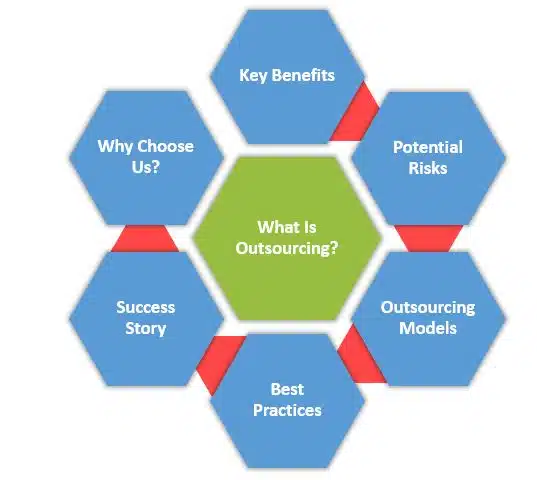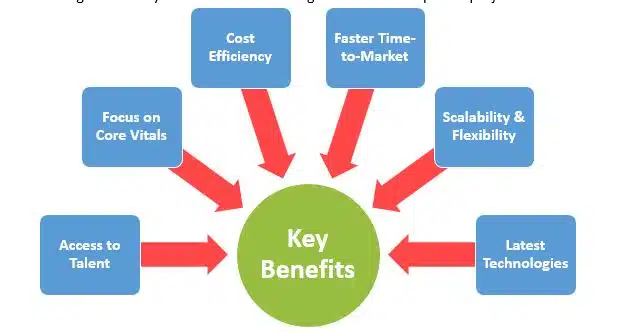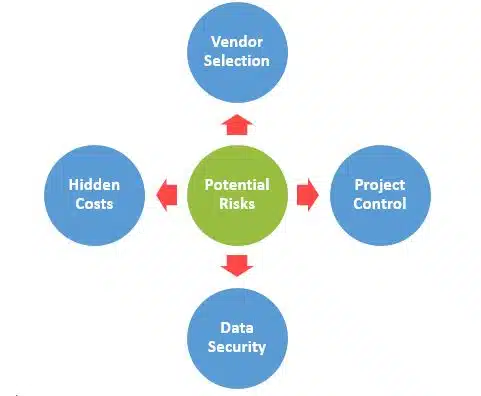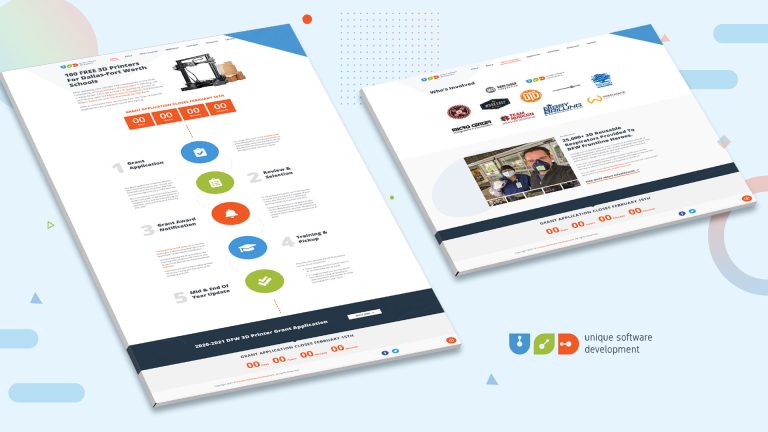Table of Contents
ToggleIn today’s digital era, custom software development is integral to running a successful business, driving operational efficiency, and enhancing customer experiences. However, maintaining an in-house development team is costly and resource-intensive. As a result, outsourced software development is emerging as a viable, strategic solution for both enterprises and startups seeking cost control, speed, and access to global talent. This guide will take you through everything you need to know about outsourcing software development—its benefits, risks, models, and best practices to ensure success.

What Is Software Development Outsourcing?
Software development outsourcing refers to the practice of hiring a third-party service provider to handle software development tasks, either partially or entirely. It could range from developing proprietary business software to managing core applications or maintaining solutions for end users. By outsourcing, companies can bypass the complexity of building and managing an in-house team while still getting access to world-class expertise and technology.
Whether it’s a multinational enterprise looking to scale or a startup wanting to reduce time-to-market, outsourcing has become a common and effective strategy in the global IT landscape. According to a Statista report, software development is one of the most commonly outsourced IT functions, driven by its potential for cost efficiency and speed.
Key Benefits of Outsourcing Software Development

The following are the key benefits of outsourcing software development projects:
1. Access to a Global Talent Pool
One of the biggest challenges of in-house software development is the limited access to talent, particularly in niche areas like AI, machine learning, or blockchain. By outsourcing, businesses can tap into a global pool of skillful developers with diverse expertise spanning multiple industries and technologies. For example, countries like India, Ukraine, and Brazil are renowned hubs for offshore outsourcing, offering talented developers at competitive rates without losing quality.
2. Focus on Core Business Activities
For companies outside the tech industry, building software is not their primary emphasis. Outsourcing software development allows businesses to concentrate on their core activities, such as growing customer bases, enhancing product offerings, or managing operations, while leaving the technical aspects to expert providers. For instance, an e-commerce company might outsource the development of an advanced inventory management system while dedicating internal resources to marketing and sales.
3. Cost Efficiency
Maintaining an in-house software development team involves significant upfront investment—recruiting developers, setting up infrastructure, and acquiring software tools, not to mention ongoing training costs. Outsourcing eliminates these costs by allowing you to hire development companies that already have the infrastructure in place. For example, outsourcing firms in regions like Eastern Europe or Southeast Asia offer high-quality services at a fraction of the cost compared to U.S. or Western European developers. They enable businesses to reduce expenses while maintaining high standards.
4. Faster Time-to-Market
Software outsourcing firms specialize in rapid development and project execution. With an outsourced team, businesses can leverage a round-the-clock work model, drastically reducing development timelines. For example, companies that outsource to a skilled software provider can often launch products faster than those relying on internal teams, thanks to the outsourcing firm’s experience and focused effort. This advantage is particularly crucial for tech startups aiming to be first-to-market.
5. Scalability and Flexibility
Outsourcing offers businesses the ability to scale their development efforts up or down based on project requirements. Whether you need to add more developers during a crucial phase of development or reduce the team size after a product launch, outsourcing providers have the resources to adjust quickly. This level of flexibility is often difficult to achieve with an in-house team, where recruiting and onboarding can slow down progress.
6. Leverage the Latest Technologies
Outsourced software development gains you access to cutting-edge technologies without investing in expensive training or tools. For instance, if you need to develop an application using the latest AI or blockchain innovations, the outsourced team can provide immediate expertise and solutions tailored to your project.
Potential Risks of Software Development Outsourcing

While outsourcing offers a myriad of benefits, there are also risks that businesses must consider:
1. Vendor Selection
Finding a reliable outsourcing partner with the right technical expertise and experience is crucial. Partnering with an unqualified vendor can result in poor-quality code, delays, and even project failure. To mitigate this risk, it’s essential to thoroughly vet potential vendors by examining their portfolios, customer reviews, and technical capabilities. Working with a reputable firm, such as one with experience delivering for Fortune 500 companies, can alleviate these concerns.
2. Project Control and Communication
Outsourcing can lead to a sense of losing control over the development process. Establishing clear lines of communication, assigning a project manager, and using project management tools like Jira or Trello can help ensure you maintain oversight and that development is aligned with business goals. For example, regular video meetings and progress reports can keep everyone on the same page.
3. Data Security and Intellectual Property
Outsourcing often involves sharing sensitive data with an external team, which presents security risks. Before outsourcing, it’s vital to assess the vendor’s security protocols, ensuring they comply with data protection laws and have a track record of secure development practices. Incorporating non-disclosure agreements (NDAs) and clearly defining intellectual property (IP) ownership in the contract are key steps to safeguarding your business.
4. Hidden Costs
Though outsourcing is generally cost-effective, there may be hidden fees, such as additional project management hours, unplanned revisions, or licensing costs. It’s important to have a well-drafted contract that outlines all possible costs upfront and includes contingencies for any changes in project scope.
Outsourcing Models: Choosing the Right Fit

When outsourcing, selecting the appropriate engagement model is critical to success:
1. Time and Material (T&M)
In this model, you pay for the actual time and resources spent on the project. It’s flexible but can lead to variable costs, making it best suited for projects with evolving requirements.
2. Fixed Price
Ideal for well-defined projects, this model involves agreeing on a predetermined cost upfront. It offers certainty in budgeting but limits flexibility if project scope changes later.
3. Dedicated Team
It involves hiring a dedicated development team for long-term projects. It’s an excellent option for companies needing ongoing support, such as maintaining and updating software post-launch.
Best Practices for Outsourcing Success
To maximize the benefits of outsourced software development, follow these best practices:
1. Clearly Define Project Scope and Goals
Outline your specific requirements and objectives from the beginning. Lack of clarity can lead to delays and misunderstandings.
2. Thoroughly Vet Potential Vendors
Conduct research, request references, and evaluate portfolios. Ensure the vendor’s expertise aligns with your project needs.
3. Establish Clear Communication Channels
Set up regular meetings and designate a project manager to streamline communication and ensure accountability.
4. Secure Intellectual Property Rights
Ensure your contract includes clear provisions regarding IP ownership and confidentiality agreements.
Time for a Success Story – Hub-Connect
In an increasingly interconnected world, efficient logistics and seamless freight transportation are the nervous systems of global business operations. Hub Group, a leading player in freight, parcel, and logistics solutions, needed a comprehensive, user-friendly platform to streamline its services across various industries. Enter Unique Software Development, which, through its innovative approach to software development, brought Hub Group’s vision to life with ‘Hub-Connect’—an end-to-end web app connecting dispatchers, carriers, and clients for smooth logistics operations.

1. Project Overview
The goal was simple yet aspiring: to unify multiple logistics functions such as cargo management, FTL (Full Truck Load), LTL (Less Than Truck Load) optimization, and final mile services into one efficient, scalable platform. While the logistics and transportation industry was filled with fragmented solutions, Hub Group saw an opportunity to provide a complete, cohesive offering that could simplify processes for their clients. However, the project required extensive expertise, complex integrations, and the latest technology—challenges best solved through outsourced software development.
2. Why Hub Group Chose to Outsource
Outsourcing the development of Hub-Connect was a strategic move for Hub Group. By partnering with Unique Software Development, they gained access to a global talent pool of experts capable of delivering advanced solutions at a fraction of the cost compared to maintaining an in-house team. Hub Group also capitalized on the agency’s rich experience in machine learning, UX/UI design, and logistics optimization, ensuring that their platform would be cutting-edge and fully aligned with the needs of a fast-paced industry.
3. The Challenges and Unique Software Development’s Solution
Developing Hub-Connect posed several technical challenges, including:
Multimodal Transit Integration
Tracking parcels across different transport modes, such as sea, air, and road, required a robust system. The agency built a centralized tracking system that integrated all modes, ensuring seamless freight movement across the world.
Real-Time Freight Quotations
Calculating precise, real-time freight rates was no small feat. With big data mining and machine learning algorithms, the service provider implemented a live quotation system that provided accurate, real-time pricing to clients.
Document Consolidation
Logistics operations often come with complex documentation requirements. The outsourcing partner created a document management system that provided instant access to shipping paperwork, making consolidation and retrieval easier for clients.
Scalability
As the platform grew, so did the need to scale. The agency ensured that Hub-Connect could easily handle increasing transaction volumes, adding resources and capabilities without sacrificing performance.
4. Key Features of Hub-Connect
Here are the key features of the final solution:
Multimodal Network
A single platform offers access to ground, sea, and air freight services, allowing clients and dealers to manage all logistics operations from one place.
Live Quotations
Using historical data and real-time inputs, the system delivers precise and dynamic quotes for freight shipments, reducing delays and improving pricing accuracy.
Traffic and Weather Alerts
Built-in overlays provide live weather and traffic updates, allowing businesses to optimize routes and reduce delivery times and costs.
Freight Analytics
Granular data visualization helps businesses make informed decisions on freight volume, mode, and costs, contributing to enhanced operational efficiency.
Accessible Documents
A central repository allows businesses to retrieve shipment documents at any time, simplifying the often tedious process of logistics paperwork.
5. Outsourcing – The Game-Changer for Hub Group
The decision to outsource the development of Hub-Connect to Unique Software Development resulted in a highly successful project, delivering the platform on time and within budget. Outsourcing allowed Hub Group to focus on its core business while relying on a team of dedicated developers to build and refine the software.
The software development company’s ability to scale resources ensured that the platform could handle complex logistics operations from day one. The team’s deep understanding of the logistics industry, coupled with their technical expertise, provided Hub Group with a platform that not only met current needs but was also future-proofed for growth and innovation.
Why Unique Software Development is an Ideal Outsourcing Partner
This success story exemplifies the advantages of outsourcing software development to a trusted partner like Unique Software Development. Whether your business is in logistics, e-commerce, or any other industry, outsourcing software projects can deliver cost savings, speed to market, and access to the latest technologies. It has a proven track record of building innovative, scalable solutions across a wide range of industries.
1. Expertise in Technologies
With deep knowledge of machine learning, ASP.NET, and data analytics, our team can handle the most complex software requirements.
2. Scalability
Whether your project needs additional resources or unique skills, we can scale quickly to meet demands. Our cloud platforms guarantee that your database grows with users and data load.
3. Cost Efficiency
Outsourcing eliminates the overhead of maintaining an in-house team while still accessing top talent. Moreover, you only pay for the functionalities you need, eliminating extra costs.
4. End-to-End Solutions
From ideation to deployment, Unique Software Development offers a turnkey approach to software development, ensuring seamless integration and a flawless final product.
5. Value Addition
It takes a whole different level of dedication and courage to reach beyond traditional means and dig out an innovative value addition approach that results in your project’s uniqueness.
Conclusion
Outsourced software development is a powerful strategy for businesses looking to cut costs, accelerate time-to-market, and leverage global talent. By choosing the right outsourcing model, defining clear project goals, and partnering with a reputable vendor, companies can maximize the advantages of outsourcing while mitigating its risks. With careful planning and execution, outsourcing can drive innovation, improve efficiency, and help businesses stay competitive in today’s fast-paced digital marketplace. Reach out to us if you’re ready to join forces with us!





























